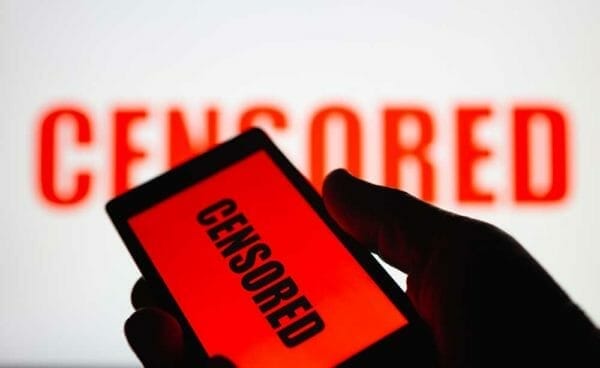Ftc Should Focus On 2nd Amendment As The #1 Most Disfavored Political Speech

Opinion
censorship Facebook election interference iStock-klevo 1160557926.jpgThe Federal Trade Commission (FTC) has announced an official request for public comments on censorship by Big Tech companies.
This move, under new Chairman Andrew Ferguson, signals a potential crackdown on the unchecked power of Silicon Valley’s most influential companies. Americans can document instances where they have faced consequences for engaging in political speech disfavored by tech platforms.
While the FTC’s announcement is a positive step toward addressing politically motivated suppression, there is one glaring omission: The Second Amendment is, by far, the most censored topic in America’s digital public square.
For years, gun rights activists, firearm industry professionals, and everyday Second Amendment supporters have been systematically deplatformed, shadow-banned, and outright erased from online spaces. Whether it’s social media giants like Facebook, YouTube, and Instagram or financial service providers denying banking services to pro-gun businesses, the pattern is clear—speech related to the right to keep and bear arms is uniquely targeted.
A Well-Documented History of Censorship
The Second Amendment community has been on the receiving end of digital suppression for years. The examples are too numerous to ignore:
- Deplatforming Gun Rights Advocates: Internet personality Hank Strange was de-platformed by Facebook without explanation or appeal process. His case is far from unique—other pro-Second Amendment voices have been silenced under vague and shifting “community guidelines.”
- Financial Blacklisting: New York Governor Andrew Cuomo’s administration pressured banks and insurance companies to cut ties with gun-related businesses. Major financial institutions have followed suit, denying services to firearm manufacturers and retailers without cause.
- Shadow-Banning Olympic Athletes: McKenna Geer, a Paralympic shooter, was shadow-banned by Meta for merely posting a picture of her air rifle. A world-class athlete training to represent her country was censored simply for participating in a legal and heavily regulated sport.
- YouTube’s War on Suppressors and Gun Education: YouTube has actively deleted content related to legal firearm suppressors, struck down channels that educate viewers on gun safety, and implemented restrictions disproportionately affecting pro-gun creators.
- 3D Printing Hypocrisy: Facebook initially banned the sharing of 3D-printed gun files, despite the fact that instructional firearm-making books have been legally available in libraries for decades. The platform partially reversed its stance in 2019, but the damage was done—gun-related information had been labeled as too dangerous for free speech.
-
Smith & Wesson Censored by Facebook: In November 2024, Facebook abruptly suspended Smith & Wesson’s page with 1.6 million followers, claiming violations of its firearm content policies. The suspension was reversed only after public outcry and a strong response from the firearms community. Smith & Wesson took to Elon Musk’s X (formerly Twitter) to thank the platform for upholding free speech. The incident underscores a larger pattern of selective enforcement and anti-Second Amendment bias across major tech companies.
Despite our extensive efforts and resources spent on trying to adhere to Facebook’s ever-changing community guidelines on firearms, our account was suspended indefinitely on Friday, November 22nd, 15 years after its original creation.
In an era where free speech and the right to… pic.twitter.com/cJkIni54kV
— Smith & Wesson Inc. (@Smith_WessonInc) November 27, 2024
Congress Investigates YouTube’s Anti-Gun Bias
The FTC is not the only government entity scrutinizing Big Tech’s suppression of gun rights. On June 18, 2024, House Judiciary Committee Chairman Jim Jordan (R-OH) sent a letter to Alphabet, YouTube’s parent company, demanding documents and communications related to YouTube’s latest crackdown on firearms-related content.
Jordan’s letter raises serious concerns about whether YouTube’s decision to further censor gun-related content was influenced by government coercion. The Committee has already obtained evidence showing that the federal government has pressured Alphabet to censor content that did not violate its own policies. Further, New York District Attorney Alvin Bragg publicly celebrated YouTube’s new restrictions, suggesting they were a direct result of his office’s demands.
This development adds weight to concerns that Big Tech is not acting independently but is instead colluding with anti-gun government officials to systematically silence pro-Second Amendment speech.
Jordan’s investigation could reveal the extent to which the Biden administration and other government entities have worked behind the scenes to influence private censorship decisions.
Big Tech’s Coordination with Government Anti-Gun Agendas
The FTC’s call for public comments also asks whether Big Tech’s censorship decisions were made under pressure from government agencies. If that’s the case, it could constitute illegal collusion to suppress constitutionally protected speech.
Evidence suggests this is exactly what’s happening. Missouri and Louisiana attorneys general sued the Biden administration in 2022, exposing widespread coordination between the federal government and social media companies to censor speech on COVID-19 policies and other politically sensitive topics. It’s no stretch to assume that the same government-tech collusion is in play against Second Amendment supporters.
Meta CEO Mark Zuckerberg has already admitted that the Biden administration pressured his company to censor “true” content that government officials deemed politically inconvenient. We all know this pressure extends to gun rights advocacy; it represents a direct attack on both the First and Second Amendments.
The Second Amendment Must Be the FTC’s Priority
While all politically motivated censorship is concerning, no topic has faced more aggressive, systematic suppression than the GOD-given right to keep and bear arms. The FTC’s investigation must prioritize hearing from gun rights supporters, firearm businesses, and pro-Second Amendment activists who have been erased from the digital public square.
A true investigation into Big Tech’s abuses cannot ignore the financial blacklisting, de-platforming, and speech suppression that have become standard practice for Silicon Valley elites intent on disarming the American people. If the FTC is serious about addressing censorship, it must start by tackling the most glaring example: the silencing of Second Amendment voices.
It’s time for gun owners and pro-2A advocates to make their voices heard. The FTC’s request for public comments presents a rare opportunity to expose Silicon Valley’s war on the Second Amendment for what it is—an orchestrated campaign to suppress and ultimately erase lawful gun ownership from American discourse.
What You Can Do
The FTC is asking Americans to submit examples of censorship they’ve faced from Big Tech. If you’ve been shadow-banned, had posts removed, or been denied services because of your support for the Second Amendment, now is the time to speak up.
Don’t let this moment pass. Submit your comments to the FTC and demand that the agency investigate the full scope of digital censorship—including the undeniable war against gun owners and Second Amendment advocates.
YouTube Censorship Of Suppressor Content & Wholesale Deletion of Creators
Censored by Facebook! Smith & Wesson Fights Back, Rallies 2A Community to Join X
About Tred Law
Tred Law is your everyday patriot with a deep love for this country and a no-compromise approach to the Second Amendment. He does not write articles for Ammoland every week, but when he does write, it is usually about liberals Fing with his right to keep and bear arms.


